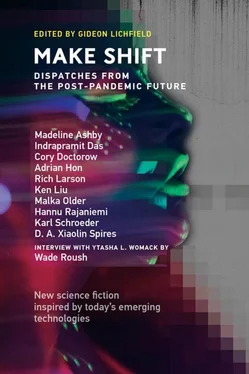“It’s not going to be so exciting,” her mother grumbled. “You are imagining me much more important than I am.”
And Chela told her mother what she would have liked to be able to say to every elder as she interviewed them. “No one is more important than you are.”

Archival VNN footage of Ruutuutuu Protests at the Port of Seattle, Pier 91, July 10, 202X
[A MAGNIFICENT CRUISE SHIP, PACIFIC UNICORN , IS DOCKED AT THE PIER, READY TObegin its seven-day tour of the Inside Passage. Luggage is being loaded; passengers in long lines are embarking; everything seems perfect: a normality that everyone has been craving for many months during the pandemic.
Except… a swarm of small boats—dinghies, speedboats, kayaks, even a few fishing trawlers—numbering in the high hundreds have congregated in front of the cruise ship, filling much of Elliott Bay and blocking its course. Protesters throng the pier, holding up signs with the mustachioed cartoon rutabaga that has become the symbol of the movement and shouting “Shut it down!”]
Interviewer:Unicorn Cruises say that they’ve implemented every precaution for the safety and health of the crew and the passengers. All their ships have obtained the STERLING-20 certification—
Protester:STERLING-20 is a worthless piece of marketing spin. The certification process was created by the cruise industry, for crying out loud. The truth is, there is no way to run cruises safely. None! Have you forgotten what happened barely two years ago? My parents were stuck on that ship wandering the Pacific with no port to take them in, and they both got infected. My mother died. Do you understand? Died. How can you pack thousands of people into close quarters like cattle, feed them at trough-buffets, recirculate the same air in every room… and believe this can ever be safe ? It’s a goddamned lie.
Interviewer:There’s been no evidence of another pandemic—
Protester:[mimics] “There’s been no evidence…” Where have I heard that before? The virus hasn’t gone away. We’ve got to live with this thing for the foreseeable future. And the next pandemic will come—it’s not if , but when . No more cruises. No more tour groups. No more jumbo jets stuffed full of sweaty bodies breathing on one another for twenty-plus hours. No more tourism. Shut it all down!
“See the World Like You’ve Never Seen it Before”—video advertisement for Unicorn Travel Enterprises, produced by TIDE=/=AL Partners, September 202X
[THE GREAT PYRAMID OF GIZA LOOMS IN OUR VIEW LIKE A MOUNTAIN.
The camera holds still as time speeds up. The sun rises and sets; the stars spin overhead; shadowy figures flit in and out of frame like mayflies dancing with eternity; the pyramid’s shadow sweeps across the sand like the gnomon of a world-pacing sundial. New Age music plays.
Then, just as the sun is low in the west once more, the music stops, time returns to normal, and the camera begins to move forward, swaying slightly from side to side.]
Woman (O.S.):They tell me the record for climbing to the top is six minutes twenty-nine seconds.
[We’re running toward the base of the pyramid. Faster and faster. Despite the optical stabilization, the swaying becomes more pronounced.]
Woman (O.S.):( Panting ) I signed up to be first in line today so I wouldn’t have to slow down for anyone else.
[We reach the bottom of the pyramid. The camera tilts up. The jagged blocks seem to scrape heaven.
We climb. Although the action cam is clearly streaming the POV of the climber, we don’t see her hands or feet. In fact, for viewers who are used to consuming such footage, there’s something distinctly odd about the camera angel and movement—too close to the surface, perhaps?]
Woman (O.S.):Talk to you again at the top.
[Up-tempo, pulse-pounding music plays. We hear the sounds of her exertion over sped-up footage of the ascent. Most of the time, the unsteady camera is focused on the limestone block or blocks right in front of the climber. But from time to time, it swerves for a peek at the apex. Closer. Closer. It’s frantic, thrilling, exhilarating.
Finally, we reach the top.]
Woman (O.S):Oh… Wow…
[The camera swings around to give us a dizzying view: the Pyramid of Khafre nearby, which appears even taller than our summit; the sprawl of Cairo in the distance, reminding you that almost five millennia of history have been compressed under your feet; the hazy horizon all around you, promising unknown, arcane knowledge; the vertiginous sensation that you’re about to plunge hundreds of feet to your death…
Only then do you notice the unusual scene on the slanting face of the pyramid below you: dozens of robots scrambling up the limestone blocks after you. Each robot is about the size of a large dog, with four padded feet that grip tightly onto the limestone blocks, a camera in front, and a screen that shows the face of a climber-teleoperator. A quick scan of the screens reveals that the climbers come from all over the world.
A robot hand rises into the camera’s view, waving.
The screen splits to show a woman in climbing gear strapped into a full-motion harness waving. Her movements have been mapped into the movements of the robot. She lifts off her full-immersion goggles, wipes the sweat from her face, and proudly holds out her watch for the viewer.]
Woman:Six minutes and twenty-six seconds. Not too bad.
[The Unicorn Travel logo swerves onto the screen, followed by a link to their web site.]
Woman:And I’ve still got enough time to shower before work.
[Text on screen: A NEW WAY TO TRAVEL: EVEN BETTER THAN BEING THERE.]
“Opinion: It’s Time to Admit It: We Were Wrong to Oppose the Ruutuutuu Movement,” by Johanna Tung, Boston Globe , July 10, 203X
LIKE MANY OF YOU, I WAS DISMAYED WHEN THE RUUTUUTUU PROTESTS ESSENTIALLYshut down the global tourism industry shortly after the annus horribilis that was 2020. As the owner of a company specializing in curating and creating unique experiences for tourists from all over the world interested in sampling Xhong culture, my life’s work would be destroyed by the movement to abolish global tourism.
The protesters’ immediate concerns were to prevent COVID-19 from flaring up again, or, even worse, the emergence of another pandemic, but over time, their mission evolved to saving the planet from our relentless drive to consume experiences without regard to the future.
I found myself in a hard place. Having devoted much of my career to the intersection of economic development and sustainability, I understood the math behind their protest signs better than most.
The people who bought my tour packages came from Europe, the United States, Japan, Australia, the biggest cities in China and South America. They were the kind of individuals who recycled, drove electric vehicles or even biked, tried to be good to Mother Earth. They thought of themselves as good people, with expensive educations, the right opinions, virtuous intentions. That was why they wanted to spend a week living in a Xhong village and attempt to understand a way of life different from their own.
But all their efforts at conservation were wiped out and more the moment they decided to get on that plane. A jet flight to carry a family and all the luggage needed to sustain their Western comforts across an ocean or a continent is among the most wasteful activities ever invented by the human race. And that’s without even accounting for the environmental cost of transporting them from the airport over new highways, across new bridges, through mountain tunnels and flattened forests until they reached their vacation destination.
Читать дальше













